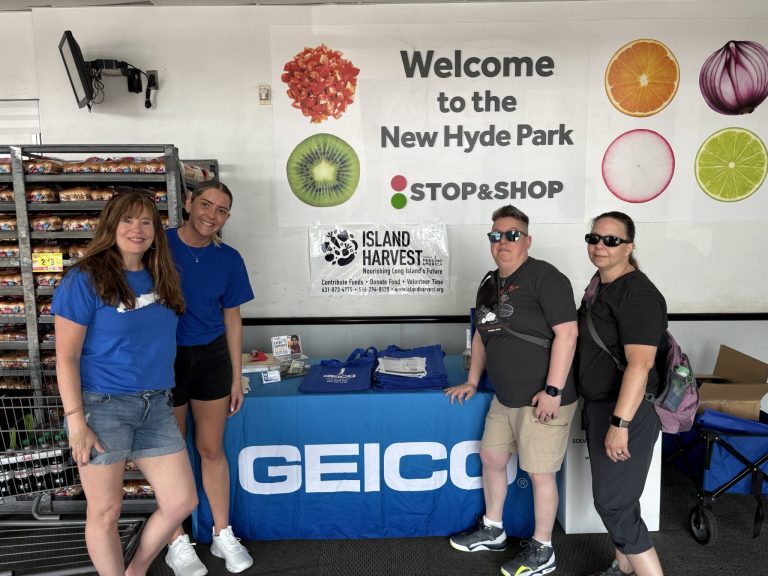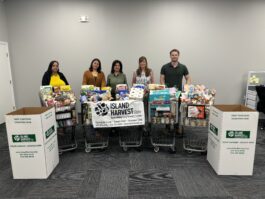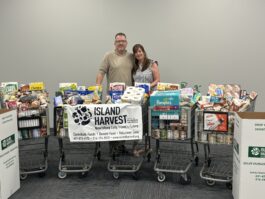
The Geico insurance agency of New Hyde Park collected six shopping carts worth of food last month to fight food insecurity on Long Island.
Ryan McGowan, co-owner of the Geico office, hosted his second annual summer food drive in collaboration with Island Harvest Food Bank. McGowan and other volunteers set up a table outside of Stop & Shop, where they passed out crucial information on hunger insecurity and how to fight it via flyers and posters. Over 400 pounds of food and a couple hundred dollars worth of donations were collected at the drive.


“My wife and I always want to give back,” McGowan said. “It’s part of our DNA. We always want to give back to the community. We want our business to not just help people with insurance, but we want to help them in all kinds of other ways too.”
Food drives with Island Harvest like the one Geico hosted are conducted nearly every week across Long Island. Many of them are organized by local businesses, houses of worship, and charitable-minded neighbors who want to make a difference.
“Island Harvest Food Bank is a leading human services organization whose mission is to end hunger and reduce food waste on Long Island,” the organization said. “We accomplish this through innovative programs and services aimed at enhanced hunger awareness, short-term case management, nutrition education, outreach and advocacy initiatives, a Workforce Skills Development Institute, our organic farm, and efficient food collection and distribution.”
Island Harvest’s work directly supports children, families, seniors, and veterans in times of crisis. Island Harvest Food Bank is a member of Feeding America, which is a nationwide network of food banks leading the effort to solve hunger in the United States.
“We are grateful to Geico and other businesses for their generosity and efforts in helping Island Harvest Food Bank address the critical problem of hunger on Long Island,” Randi Shubin Dresner, president and CEO, Island Harvest Food Bank, said. “These partnerships are making a huge difference in the lives of our neighbors who struggle with hunger and food insecurity.”
Don Miller, the spokesman for Island Harvest, said it is expected that Island Harvest will collect and distribute over 17 million pounds of food across Long Island this year. Much of this food is secured through donations or purchased in bulk to meet the demands of 221,000 people who are identified as food insecure.
Miller said that the Island Harvest Food Bank supplies food to nearly 300 community-based organizations, which include food pantries, parish outreach centers, soup kitchens and other emergency feeding programs in Nassau and Suffolk counties. The food bank also provides direct services to children, senior citizens and veterans through specialized programs, aimed at helping people who are food insecure among those groups.
“Island Harvest has been conducting food drives since its inception in 1992,” Miller said. “The organization was founded by Linda Breitstone, who was concerned upon seeing unsold food being thrown away at a local convenience store while women in a nearby shelter were going without. While food rescue is a small percentage of food collected, the bulk of what the organization delivers is secured through donations.”
Miller said Island Harvest is “changing the way we address hunger and food insecurity” by examining the root causes of it. The organization has several initiatives designed to lift people from uncertainty to stability including a Workforce Skills Development Institute, which provides job training and placement assistance. Also, the organization’s organic farm in Brentwood provides fresh healthy fruits and vegetables to people who rely on their services.
“(It) also teaches them how to grow their own food, along with offering tips on healthy eating and making the right food choices,” Miller said.
McGowan said he plans to continue working with Island Harvest in the future and participate in other events, such as collecting gift cards for veterans, back-to-school backpack drive, Toys for Tots, and more.
“We try to do something, at least once a quarter, if we can,” McGowan said. “Sometimes it’s small, sometimes it’s bigger, but we just try to give back as much as we possibly can.”






